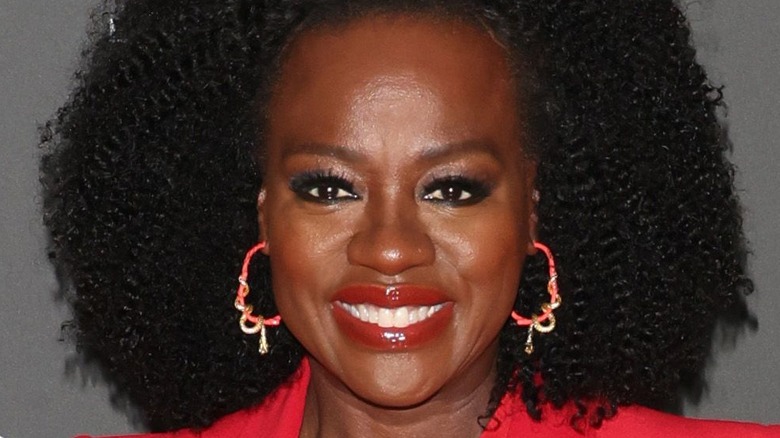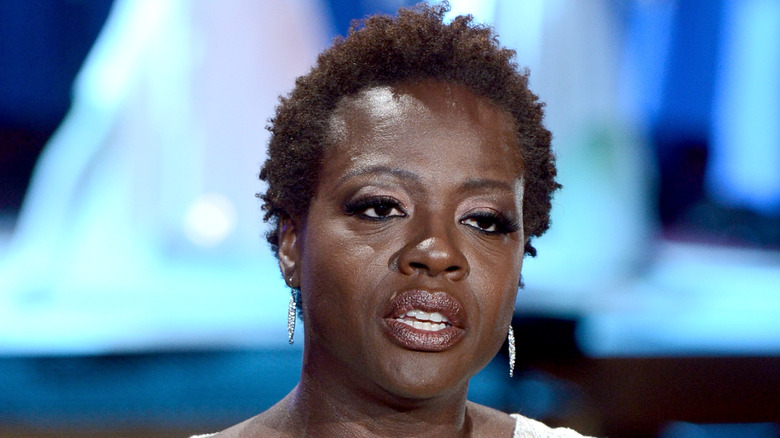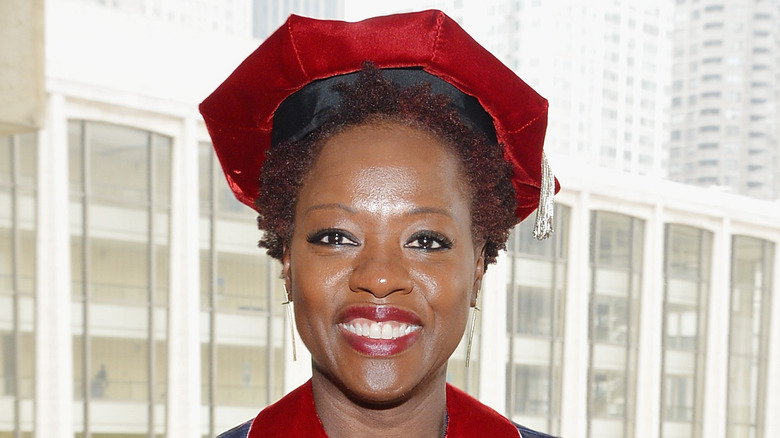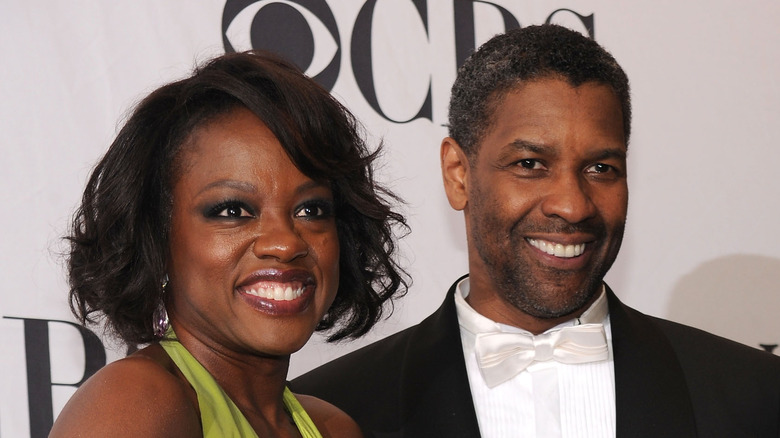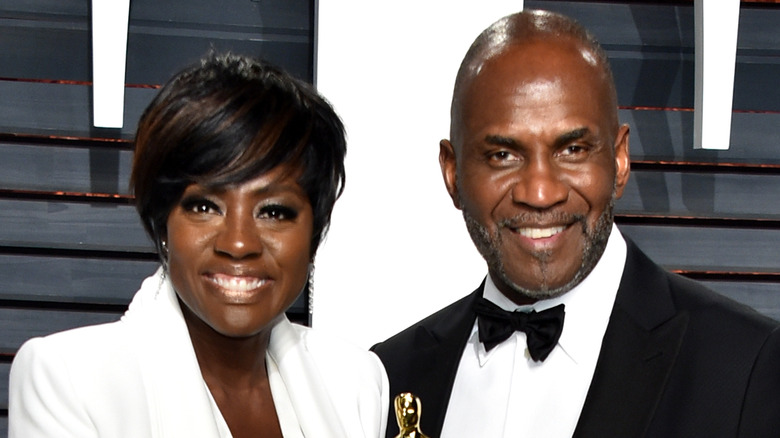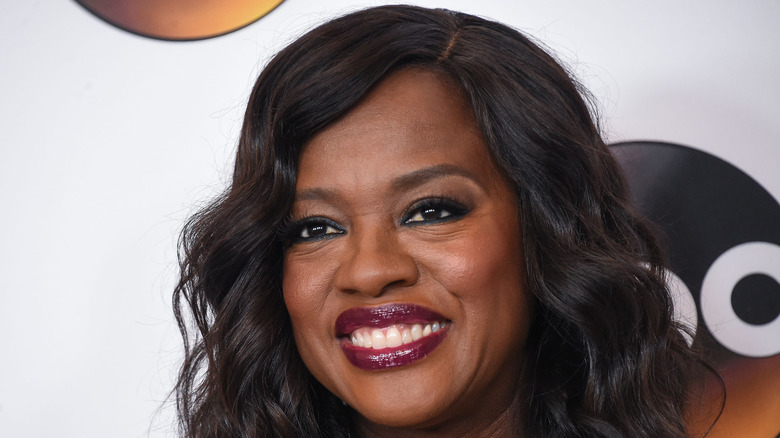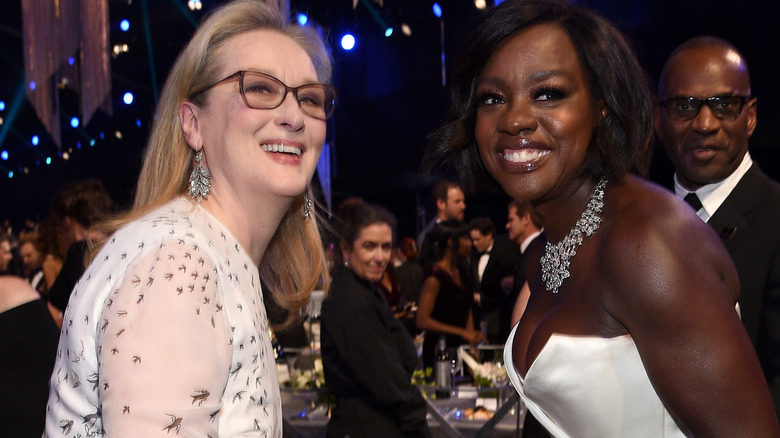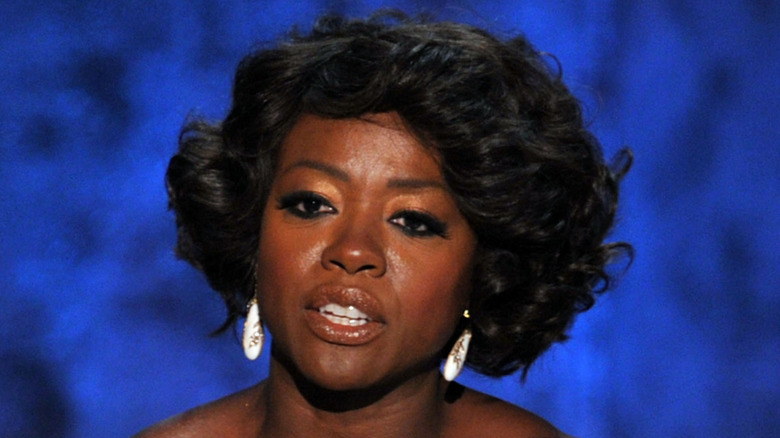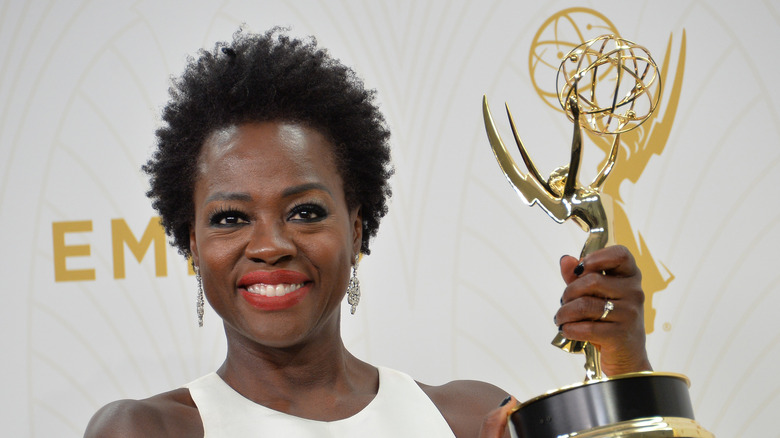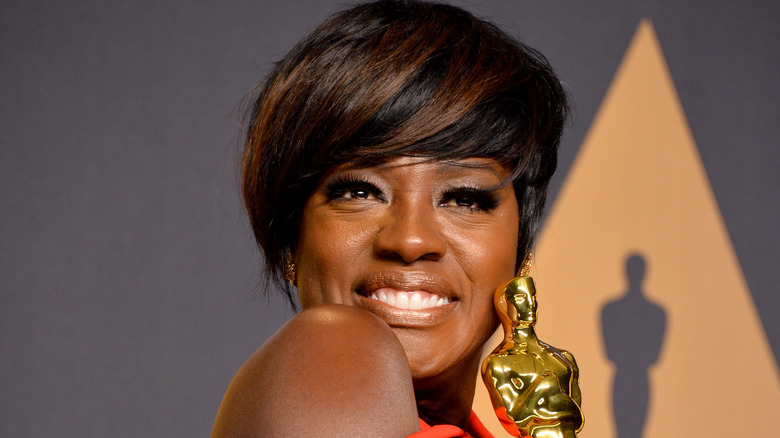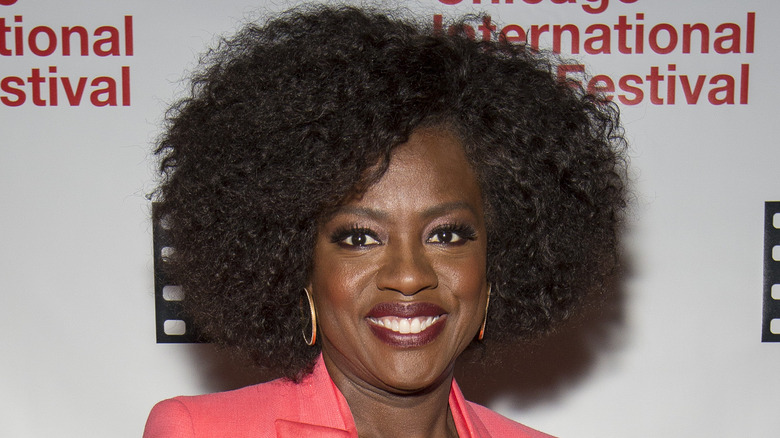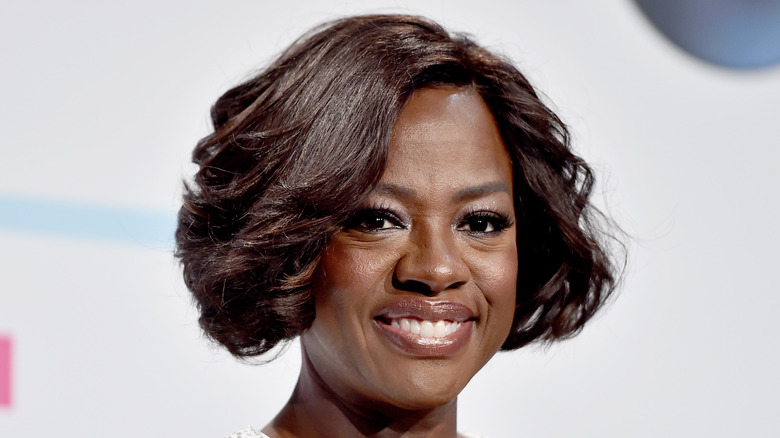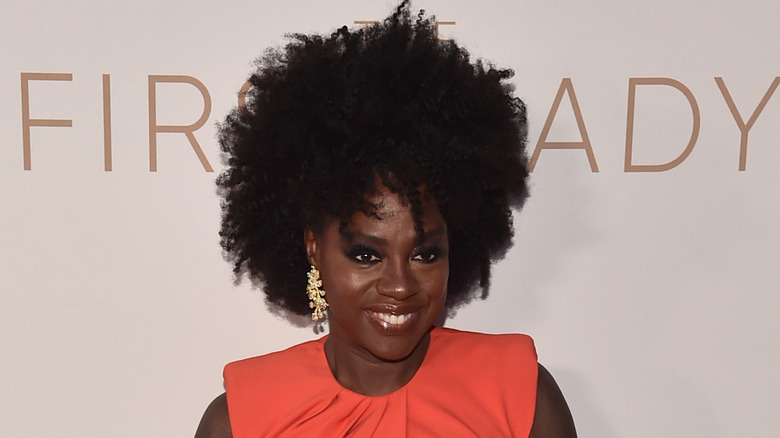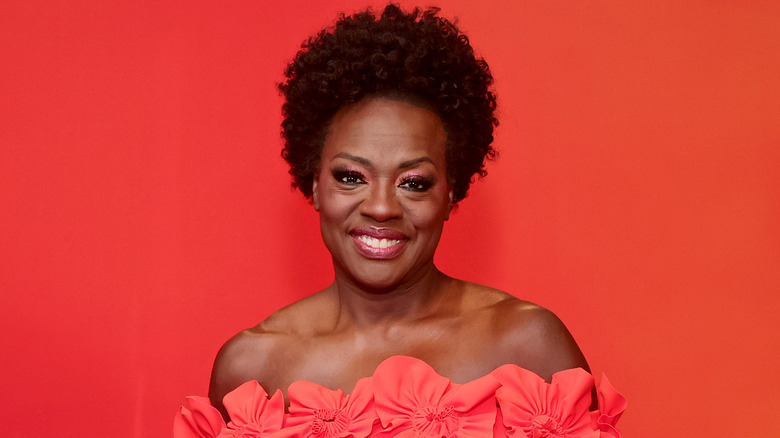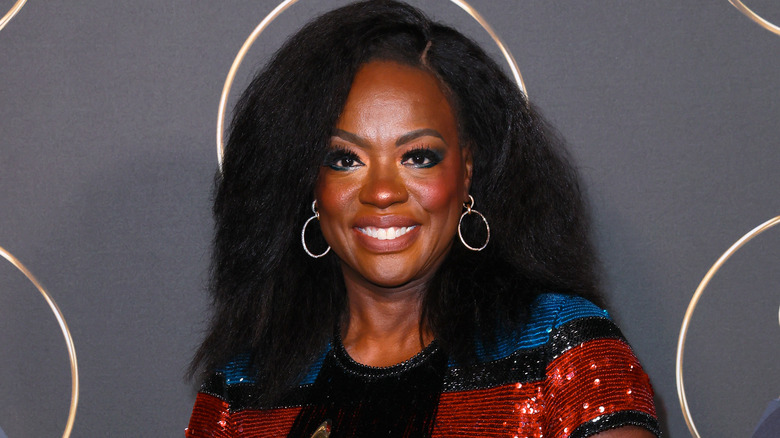Viola Davis: From TV Guest Star To EGOT Winner
The following references domestic abuse and addiction.
Viola Davis is one of the most celebrated actors working today. The Juilliard grad has been honored by the Oscars, Tonys, Screen Actors Guild, Emmys, Grammys, and more; her colleagues regularly sing her praises, recognizing her as a once-in-a-generation talent.
When Davis received her star on the Hollywood Walk of Fame in 2017, Meryl Streep gave a moving speech about her friend and former co-star. "She's possessed of a blazing, incandescent talent," Streep said. "She is, arguably, the most immediate, responsive artist I have ever worked with. She is so alive, she glistens."
The success, praise, and accolades didn't come early or easily for the talented performer; Davis battled racism, sexism, and colorism in Hollywood for years. The one thing she never lost was her determination. "When you're driven by such passion to sort of fulfill that first dream that you had when you fell in love with the work, you ride that horse into the ground," she told Deadline. And ride that horse into the ground she has. This is the story of Viola Davis' extraordinary life and career.
She grew up dirt poor
Viola Davis grew up one of six children in Central Falls, Rhode Island, in a rat-infested building that often didn't have heat, hot water, or electricity. As she detailed in her 2022 memoir "Finding Me" (via Entertainment Tonight), her family was "po." "That's a level lower than poor. ... It was reflected in the apartments we lived in, where we shopped for clothes and furniture... the food stamps that were never enough to fully feed us, and the welfare checks. We were 'po,'" she wrote. Davis wet the bed until she was a teenager, and she frequently reeked of urine because the family couldn't afford laundry detergent to wash their clothes.
Davis' family's dynamic was fraught. Her father struggled with alcohol addiction and physically abused her mother, to the point that Davis feared he might kill her. "When I was in it I normalized it, I normalized that feeling in the pit of your stomach which was extraordinary trauma and anxiety," she wrote in her memoir. "When I was younger," she revealed to Vanity Fair, "I did not exert my voice because I did not feel worthy of having a voice."
The thing that saved her from the heartache was her passion for her chosen craft. "What I had, when I didn't have confidence even when I didn't have self love, what I had was drive," she wrote in "Finding Me." "You find the joy, and the joy stomps out all the pain."
If you or someone you know is dealing with domestic abuse, you can call the National Domestic Violence Hotline at 1−800−799−7233. You can also find more information, resources, and support at their website.
If you or anyone you know needs help with addiction issues, help is available. Visit the Substance Abuse and Mental Health Services Administration website or contact SAMHSA's National Helpline at 1-800-662-HELP (4357).
Juilliard didn't honor her 'presence in the world'
When she was six, Viola Davis recalls having her first dream of being an actor after seeing Cicely Tyson on TV in "The Autobiography of Miss Jane Pittman" and feeling an undeniable connection. "My heart stopped beating," she wrote in "Finding Me" (via The New York Times Magazine). "It was like a hand reached for mine, and I finally saw my way out." After studying drama at Rhode Island College, Davis enrolled at The Juilliard School, the prestigious New York performing arts conservatory, of which she said in Vanity Fair, "It was a very Eurocentric training." She continued, "It was the type of school that did not acknowledge my presence in the world."
In her memoir (via The Guardian), Davis wrote, "The absolute shameful objective of this training was clear — make every aspect of your Blackness disappear. How the hell do I do that? And more importantly, WHY??!!!" After earning her degree from Juilliard, Davis began to explore the works of August Wilson.
In 1996, she made her Broadway debut in the author's Pulitzer Prize-nominated play "Seven Guitars," earning her first Tony nomination. In "Finding Me" (via Biography), Davis wrote, "'Seven Guitars' was a huge part of my growth as an actor. It was the difference between making the decision to become an actor, then training to become the best actor I could be, and finally putting everything that I learned to task." In 2014, Davis received an honorary doctorate from her alma mater.
Viola Davis is a two-time Tony winner
"Seven Guitars" was just the beginning of Viola Davis' revered stage career. In 2001, she came back to Broadway in "King Hedley II," another August Wilson play, winning a Tony Award for Best Featured Actress in a Play. Variety celebrated her turn as Tonya, writing, "This vibrant actress brings an electrifying edge to her role, and Tonya's defiant speech about her decision to abort Hedley's child is perhaps the most anguished and beautifully realized moment in the play."
In 2010, Davis and Denzel Washington first appeared together on Broadway in Wilson's Pulitzer-Prize winning play "Fences," as Rose and Troy Maxson. In an interview with The New York Times, director Kenny Leon explained that for "Fences" to work, chemistry between the two leads isn't enough. "You need people who can convey through body language, through pauses, even through the pace of their breathing around one another, that Rose and Troy are everything to one another," he said.
It proved to be an on-stage match made in heaven. Both actors took home Tony Awards for their performances, and nearly all of the cast members in the production reprised their roles in the 2016 film. Backstage Magazine raved of the play, "Denzel Washington is magnificent in the role indelibly created by James Earl Jones, and the astonishing Viola Davis matches him every step of the way. It's a deeply moving, hugely satisfying evening of theater."
She met the man she prayed for on a TV set
As a single woman in her 30s, Viola Davis underwent an operation to remove fibroids from her uterus, which can cause complications with pregnancy or childbirth. She told The Guardian that she prayed to God for her future husband, an "ex-athlete," "someone real country" and someone who "had a wife before me and children already." A few weeks later, she met Julius Tennon on the set of CBS' "City of Angels," an actor and producer from Texas who played college football and had two children from a previous marriage.
In an interview with Jess Cagle for People, Davis recalled their first meeting. "The only thing I thought was, 'He's good-looking. He's really good-looking,”' she said. But things didn't get off to a great start after Tennon gave Davis her card and offered to take her out. "I didn't call him for six weeks," she admitted, noting that she had some personal and financial issues she had to iron out first.
"The minute we started dating, all of it went away. His energy, his exuberance, the absolute amount of love and kindness he had, it just transformed me immediately," Davis added. The couple tied the knot in 2003, and they adopted their daughter Genesis in 2011. "The love of a man who puts you first, who is evolved and who always wants to be better for you, is Julius's love capacity," Davis wrote in "Finding Me" (via ET).
Viola Davis says being 'too dark' cost her roles
Fresh out of Juilliard, Viola Davis scored guest roles on shows like "NYPD Blue" and "Judging Amy," and nabbed small parts in movies like "Out of Sight." However, her career didn't take off the way she hoped. As she told The New York Times Magazine, casting directors overlooked her because, as she put it, they believed her to be "too dark" and "not classically beautiful."
"There were awesome shows on TV that displayed the cute Black girl who had autonomy and material wealth. But none of those women looked like me," Davis wrote in "Finding Me" (via Entertainment Tonight). "Culturally speaking, many believe it and they have adopted the belief that if you are dark, you're uglier, harder, more masculine, more maternal than your lighter-skinned counterparts." And even after she'd been nominated for two Oscars and established herself as a force to be reckoned with in Hollywood, some still questioned whether or not she could lead a network primetime series like "How to Get Away with Murder." As Davis said in the Las Vegas Review-Journal, "Articles were talking about my looks and how I wasn't right for it. They wrote I wasn't vulnerable enough. That I wasn't a classical beauty."
At the 2022 Cannes Film Festival, Davis shared that she is still judged by her appearance. "We could talk about colorism, we could talk about race. It pisses me off and it's broken my heart, any number of projects, which I won't name," she said.
Her 10-minute scene in Doubt earned an Oscar nod
There is no doubt the 2008 film "Doubt" was Viola Davis' breakout role. The actor plays Mrs. Miller, the mother of a troubled young boy who may have been sexually abused by a Catholic priest (Philip Seymour Hoffman). Davis only appears in one scene in the movie with the school principal, played by Meryl Streep. According to Vanity Fair, she reportedly beat out several high-profile Hollywood actors for the role, including Sanaa Lathan and Taraji P. Henson.
Of Davis' performance, Roger Ebert wrote, "It lasts about 10 minutes, but it is the emotional heart and soul of 'Doubt,' and if Viola Davis isn't nominated by the Academy, an injustice will have been done. She goes face to face with the pre-eminent film actress of this generation, and it is a confrontation of two equals that generates terrifying power." Davis did receive an Oscar nomination for the film, as did Streep, Hoffman, and Amy Adams.
Speaking to Variety, Davis said, "What makes you a better actor is being around people who you feel are more talented than you are. It scares you, and whenever you're scared, you work harder." Davis and Streep have remained lifelong pals and confidantes. "What I love about Meryl is I always feel like she sees me," "The Woman King" star told ET's Jennifer Peros in 2017 at the Time 100 Gala where Davis was being honored. "It makes me feel like she really is a friend, that she really takes me in."
The film Viola Davis regrets
The 2011 film "The Help" was one of Viola Davis' most successful films. Adapted from Kathryn Stockett's best-selling novel of the same name, the movie raked in more than $216 million worldwide at the box office. It's the story of an aspiring white author in the 1960s (Emma Stone) who writes a book about the hardships of Black maids who work for white families. Davis stars as Aibileen, one of the maids. At the time, Davis was still looking for her first major film role. "I was that journeyman actor, trying to get in," she told Vanity Fair.
Davis received her second Oscar nomination for her performance, but in a 2018 interview with The New York Times, the actor said she regrets making the film. "I just felt at the end of the day that it wasn't the voices of the maids that were heard," she explained. Davis went on to say she's grateful for the friendships she made on the set, and she praised director Tate Taylor. Speaking to The Guardian, she said, "I look back at that movie as a missed opportunity. For me, it was just too filtered down."
While the movie gave her unprecedented mainstream exposure, Davis noted that she didn't get much of a career boost afterward. "I went right back to playing the same roles I did before 'The Help,' only getting paid a little bit more money," she said. "It's like you have to sift through sewage in order to get what you feel like you deserve."
The actor is also an Emmy winner
For a few years after "The Help," a leading role evaded Viola Davis until ABC's "How to Get Away with Murder" fell into her lap. Shonda Rimes and Peter Norwalk were developing the primetime drama, and they offered Davis the role of criminal law professor Annalise Keating. Rimes never expected the two-time Oscar nominee to accept it. "I remember saying we may as well ask and let her say no so at least we can say that we asked," the producer told The New York Times Magazine via email.
At the 2014 Television Critics Association press tour, Davis explained why she made the move from film to a long-term TV series commitment. "I wanted to be the show. I wanted to have a character that kind of took me out of my comfort zone," she said (via E! News). "She's messy. She's a woman. She's sexual. She's vulnerable. And I think—I feel extremely fortunate that I am alive and still active and this role came to me at this point in my life," Davis added.
"HTGAWM" ran for six seasons on ABC before it moved to Netflix. Davis won an Emmy for her portrayal in 2015, making her the first woman of color to win the Emmy for Outstanding Lead Actress in a Drama Series. The actor's childhood idol Cicely Tyson received five Emmy nominations for her recurring role as Annalise's mother in the series.
Fences won Viola Davis an Academy Award
Denzel Washington and Viola Davis reprised their roles as Rose and Troy Maxson from the Broadway production of "Fences" in the 2016 film adaptation of August Wilson's play. The New York Times deemed both actors' work in the film among the standout performances of the year. "I think the best part of Rose is, when she's introduced in the play, she's in the background," Davis said of the role in IndieWire. "And then, when she steps forward and she's betrayed, then you hear her voice."
Washington, who also directed the film, previously worked with Davis in 2002's "Antwone Fisher," which stars Derek Luke in the titular role, and features Davis as his mother. "Viola is one of the great actors of all time, not just her time," Washington raved to Vanity Fair of his frequent co-star. "She's been recognized—obviously not too late, but later than some. But she's gone farther than most."
"Fences" was nominated for four Academy Awards, including one for Washington and another for Motion Picture of the Year. Davis took home the sole trophy for her critically acclaimed turn as Rose. "Though every performance is splendid, it's Washington and Davis who create a mesmerizing symphony of emotion, finding both love and tragedy in every look, every line," wrote The Seattle Times. While accepting the Oscar for Best Supporting Actress, Davis said, "I became an artist and thank god I did because we are the only profession that celebrates what it means to live a life."
Widows was a game-changer
In 2018, Viola Davis starred as Veronica in Steve McQueen's heist thriller "Widows." It was the actor's first leading role in a major studio film. As Davis noted in The Guardian, the kiss she shared with Liam Neeson at the top of the film made the role especially significant. "That is, a dark-skinned woman of color, at 53 years old, kissing Liam Neeson. Not just kissing a white man," she said, "Liam Neeson, a hunk. And kissing him sexually, romantically."
Davis stars alongside Michelle Rodriguez, Elizabeth Debicki, and Cynthia Erivo in the movie as a group of women forced to clean up the financial mess left behind by their dead husbands. She called the film a "gift" from the "12 Years A Slave" director, who co-wrote the script with "Gone Girl" author Gillian Flynn.
The actor added that she would love to play a Black female "Klute" or "Annie Hall," but she wondered, "who's gonna write it, who's gonna produce it, who's gonna see it, again and again and again?" Unfortunately, not too many flocked to see "Widows." The flick underperformed at the box office in spite of its strong reviews. The Globe and Mail wrote, "Led by a magnificent Viola Davis, the cast is ridiculously stacked. The action is tremendous. And the ultimate message – that nothing comes for free in America – is devastating in its swift brutality."
Yet another Oscar nomination for Viola Davis
When Denzel Washington first approached Viola Davis about starring in "Ma Rainey's Black Bottom," she didn't think the role was right for her. "I see myself as a lot of August Wilson characters, but not that one," she told Entertainment Weekly. Davis underwent a transformation to embody the real-life "Mother of the Blues," a recording artist who weighed 300 pounds and sported gold teeth.
"There's a sense of confidence with her because she owned her sexuality—she was a bisexual woman—and she was a leader. She had her own band that she paid, and she was an entrepreneur in 1927, Jim Crow America," Davis told Vanity Fair. Set during a recording session in 1920s Chicago, the film is about a group of Black band members and their high-maintenance frontwoman as she fights for respect in a white man's world. In one pivotal scene, Ma refuses to perform until she gets the cold Coca-Colas she asked for.
"In 'Ma Rainey,' everybody's fighting for their value," Davis said in The New York Times Magazine. "I wanted that to be a part of Ma Rainey. I wanted people to see what lay in the heart of her being. Which is: I know my worth." Davis received an Oscar nomination for her performance, which The New York Times Magazine named one of the Best Performances of 2020. But it was Chadwick Boseman as Levee the trumpet player who walked away with the film. "Mighty as Davis' performance may be, this is Boseman's movie," wrote Variety.
The actor's portrayal of Michelle Obama was blasted
Viola Davis plays one of the most famous women in the world in Showtime's 2022 anthology series "The First Lady." Once the show premiered, viewers took to Twitter to criticize her facial expressions and pursed lips as Michelle Obama. "They set Viola Davis up by allowing her to keep her mouth that way throughout the filming. It's so cringey and distracting," one user tweeted. "I usually like Viola Davis as an actress, but why in the tarnation did she insist on doing this with her mouth? It makes it look like a parody," another person wrote.
In an interview with BBC News, Davis said that while she knows criticism comes with her line of work, it still can sting. "How do you move on from the hurt, from failure?" she asked. Speaking to ET's Nischelle Turner, Davis explained why taking on the role of the best-selling author was an especially tall order. "You're terrified whenever you start a job because you are afraid you are going to be found out — that's big imposter syndrome. But with Michelle Obama, it's like everyone has ownership over [her]," she said.
"Not everything is going to be an awards-worthy performance," Davis told BBC News. The series, which also stars Michelle Pfeiffer as Betty Ford, and Gillian Anderson as Eleanor Roosevelt, will likely go down in history as one of Davis' rare debacles. Entertainment Weekly maintained the three actors weren't given strong enough material; The Guardian called it a "third-rate disappointment."
She unleashed her inner warrior in The Woman King
Viola Davis and her husband Julius Tennon had a lot riding on 2022's "The Woman King." They were both producers on the film under their Juvee Productions banner. It took six years to get the project made, because studios were gun shy about the real-life story of an all-female band of warriors in 1820s Africa. "All praise to 'Black Panther' and its success, because that absolutely paved the way for people to see the possibility of this movie," director Gina Prince-Bythewood told The New York Times Magazine.
Davis received a Golden Globe nomination for her performance as Agojie general Nanisca in the movie. "This film is for maybe even all naysayers who didn't ever believe that Black women, especially dark-skinned women, could lead a global box office, could open a film," Davis said at the TIFF screening, according to the Toronto Sun. The flick received a near-perfect audience score on Rotten Tomatoes, and much critical acclaim.
Surprisingly, the film didn't receive a single Oscar nomination; neither did "Till" nor "Nope," two other critically acclaimed Black-led films from that year. Prince-Bythewood addressed the snubs in an essay to The Hollywood Reporter. "It's a difficult thing to know, for every Black filmmaker and definitely every Black female filmmaker, that your work is not valued in the same way," she wrote. "I want our industry to be better."
Viola Davis is a Grammy winner, too
In 2023, Viola Davis joined an elite club of performers when she received a Grammy for her performance of the audiobook for her memoir "Finding Me." "It has just been such a journey," she said as she accepted her statuette (via The Independent). "I just EGOT!" The actor added, "I wrote this book to honor the 6-year-old Viola, to honor her, to honor her life, her joy, her trauma, her everything." EGOT status refers to artists who have received an Emmy, Grammy, Oscar, and Tony.
Davis is the third Black woman to achieve EGOT status and the 18th member of the prestigious club, which includes John Legend, Whoopi Goldberg, and Jennifer Hudson. Davis made history in 2017 with her Academy Award for "Fences," becoming the first Black artist to win the coveted triple crown of acting. After the release of "The Woman King," Davis told The Guardian, it felt like "a culmination of my career over the last 33 years."
Reflecting on the early days of her career, she recalled, "I arrived in Hollywood having hopes and dreams for my career, but never quite having ownership or agency." Things are very different these days. According to Variety, Juvee Productions signed a first-look deal with Entertainment One, which worked on "The Fabelmans" and "The Recruit." Davis will star in an HBO Max series, "Waller," reprising her DC universe character from the 2016 film "Suicide Squad." Following her hopes and dreams sure has worked out.

